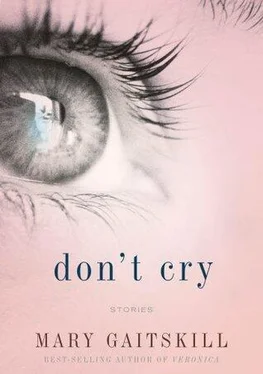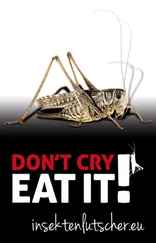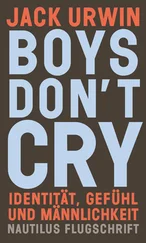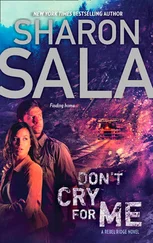Or did he? Softly, Jim sang, Way down South where the trains run fast / A baboon stuck his finger up a monkey's ass. / The baboon said, Well fuck my soul / Get your fucking finger out of my asshole. A family came down the stairs, little girls running ahead of their mother. They wouldn't think his sister would win the prize, but she would; she would race on her horse ahead of everybody, her family cheering for her. Not just her foster family, but her real family, Jim's real family. Like the Iraqis had cheered when they first came into the town. Before they had shot.
Joseph and his friend Kevin were driving to New Paltz for a hike. Kevin was driving with one hand, elbow out; Joseph had his whole arm out, hand on roof. They had finished their M.F.A.'s in creative writing weeks earlier and they felt great. Kevin had just published an essay in a big-deal magazine that paid. Joseph's mother had been really sick, but now she was getting well. It was a bright spring day; the car windows were down and the breeze smelled good. They were drinking sodas from cans and arguing about literary junk.
“It's like what John Ruskin wrote about architecture,” Kevin was saying, “a style that allows for flaws may not be the most beautiful, but it's the most engaging because it reveals a human handprint.”
“I hate that,” said Joseph, “the whole ‘human’ thing. It's a euphemism for mediocre, and anyway, it's meaningless. Only humans build buildings; only humans write books. Those things are human by definition.”
“You're mimicking Braver,” said Kevin; he meant Professor Janice Braver.
“How? Janice never said that; I said it,” said Joseph.
“She said it. Maybe in private conversation with me, but she said it.”
“Since when were you having private conversations with her? You didn't like her. Anyway, horrible things are human — rape and murder are human.”
“Don't change the subject,” said Kevin. He took a sharp, slow curve that made the car feel unwieldy and boatlike. “To say art is human doesn't mean it's morally good; it means it engages you. It's not static, with everything in place; it's everything, including flaws and clumsiness.”
“ ‘It's everything,’” mimicked Joseph. “That's vague and grandiose.”
“Bellow and Roth write about everything.”
“That's not why they're great. They're great because—”
Kevin swerved into the park so sharply that the soda popped out of Joseph's can and splashed his face. Joseph yelped “Shit!” then wiped his chin with his shirt and said, “I said they're great because—”
But Kevin was already out of the car and rummaging in the back for water and lotion. Joseph got out, saying, “Bellow and Roth are great because—” Two girls in shorts and hiking boots came walking down the trail, cool and laughing, as if they'd just come out of a movie theater. “They're great because they're deep,” said Joseph, looking at the smaller of the girls.
Kevin straightened and the girls both turned to look at him; even at a distance, Joseph could see them spark up. Kevin was tall and athletic; he had broad shoulders and a wide mouth. Aware of them but not looking at them, he flexed his chest as he shouldered a light pack. “They write about particular things deeply,” said Joseph, and threw soda in Kevin's face. Kevin shook the bright drops off him and swiped at Joseph; Joseph swiped back. The taller girl looked back and smiled. Smiling, Kevin lunged forward, throwing air punches; Joseph danced back, feinting. The girls got in their car, talking to each other.
The boys quit playing. They rinsed away the sticky soda with bottled water and rubbed on bug lotion; Kevin put his foot up on the hood of the car to better rub his long half-naked leg. The girls pulled out of the lot, one of them smiling from the window as they went. Kevin put his leg down and gazed after them. Now he looks, thought Joseph. A family pulled up in an SUV radio blaring, two little boys in the back, one of them twirling something bright and multicolored.
They started up the trail.
Kevin and Joseph had grown up in Westchester. They became friends in junior high because both were bookish boys obsessed by horror comics in which bad things happen to girls until the hero comes. Then Kevin grew nearly two feet and began to play basketball; in high school, he made the team. Smiling girls crowded around the new hero, while Joseph looked on with dangling hands. Then Kevin's family moved to Manhattan. The boys drifted apart, but not right away; the move happened just weeks after Joseph's parents divorced, and it was somehow because of this that Joseph doggedly visited Kevin in Manhattan whenever he could. He liked being in a home with two parents. Kevin's mom, Sheila, was not pretty but her eyes were warm, and her soft, pouchy cheeks were somehow warm, too. Sometimes they wrestled in front of her, and once they pretended to have a real fight: Joseph put pieces of white candy in his mouth, and when Kevin socked him, he roared and spat the candy out like teeth. Sheila pretended to be horrified, then burst out laughing. Afterward, they took the subway to Chinatown, where they went to a cheap place and ate an enormous meal, trying everything on the menu, until they couldn't eat any more. A waiter with tattooed hands sold them illegal beers and then they walked all the way back to the West Side.
On the mountain, Joseph still remembered walking in Chinatown, the neon signs speaking bright-colored Chinese on each side of them, the dead fish and vegetables heaped in alleys and spilling out onto the pavement. As high school went on, they saw each other less often. After graduating, they so lost touch that neither realized they'd gotten into the same writing program until they both showed up at the orientation party Even in the same program, until today, they had not spent much time together, at least not alone. Still, Joseph looked at Kevin's back and remembered the wrestling, the laughter, the tattooed hands, the beers—
“So who do you think will be the next to publish something big?” asked Kevin, he having been the first.
“Adam,” said Joseph. “His thesis was so strong, and he's a hard charger.”
“Nah,” said Kevin. “I mean he's good, but he has a long way to go. I think it'll be Tom.” He paused, lunging slightly as the path steepened. “Or Marisa. I think it could easily be Marisa, with those last stories of hers.”
Marisa: the name was still a small, smartly struck bell. Joseph had been with her for three weeks and then she'd dumped him. He didn't think her recent work was that good, but he was afraid of what it would sound like if he said so. Instead, he said, “What about Andy? He's gotten good.”
“Are you kidding?” said Kevin. “He's weak. And he got weaker listening to Braver.”
Joseph sighed. “I don't think you understood what she was saying some of the time.”
“I didn't understand what she was saying? About how important it is to describe how characters look?”
How to tell Kevin that sometimes he was so busy being smart, he couldn't understand anything? Once in class, Janice said to him, “If you closed your mouth and opened your mind, you might actually learn something.” Kevin replied, “Maybe I would, if there was anything to learn here.” The room was quiet. Janice's face stiffened, then relaxed. “Wow,” she said. “You're a real pisser, aren't you?” People laughed. Kevin flushed. Joseph suppressed a smile.
“Why do you even care?” he said. “The semester's over.”
“I care about writing whether the semester's over or not.” Kevin's voice was mild, but feeling came off his slightly hunched back. “And what's important in writing is what's happening between the characters, what they are doing , not what they look like or what things look like.”
Читать дальше












